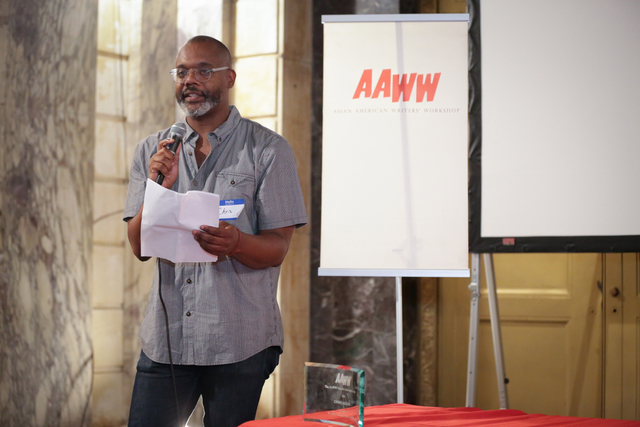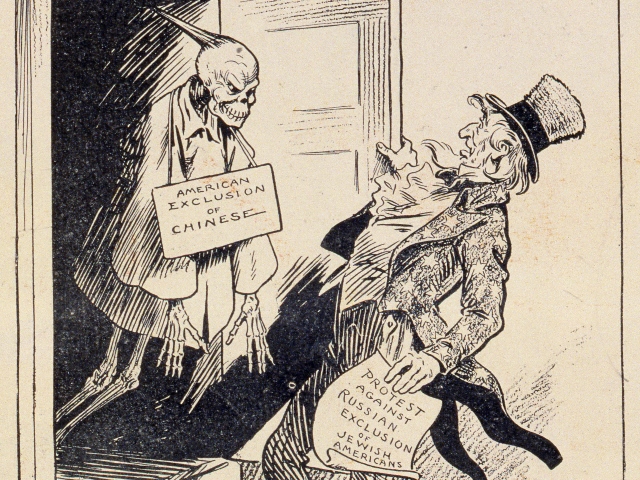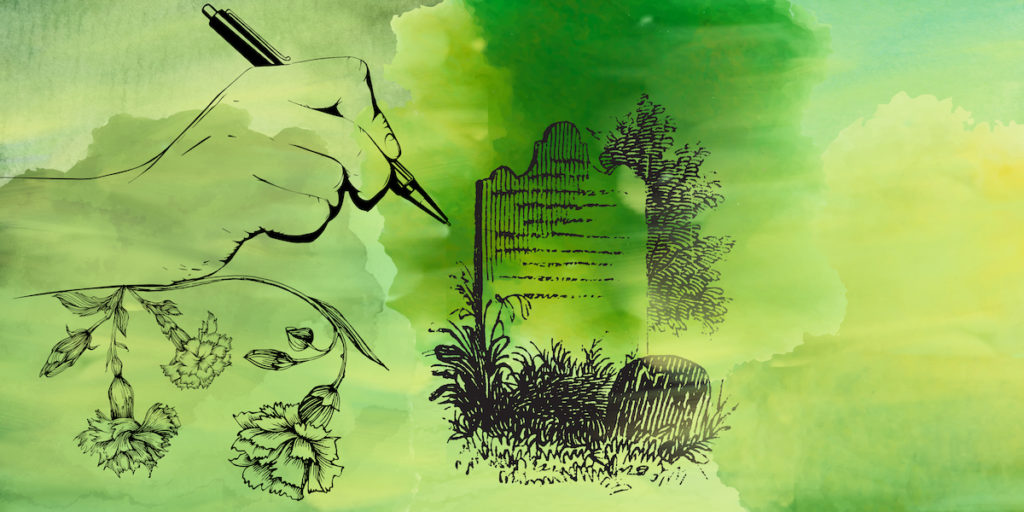To get free, to tell the truth, sometimes requires new language that might not fit through that narrow channel of the dominant culture.

July 19, 2016
On Saturday June 25, at the Asian American Writers’ Workshop’s 2016 Publishing Conference (AAWW PubCon 2016), the AAWW Editorial Achievement Award was presented to Chris Jackson. The award honors editors who have worked to support stories and writers that mainstream presses have largely ignored.
Jackson is now the publisher and editor-in-chief of the One World imprint of Random House, which upon its relaunch in 2017 will focus on publishing works that go against dominant narratives with re-imagined perspectives. He has nurtured an entire generation of writers of color like Victor LaValle, Eddie Huang, and Ta-Nehisi Coates. Jackson has created an incredible institution for writers of color in America who are dedicated to telling stories about societal inequalities and social justice.
AAWW’s Editorial Achievement Award has been previously given to Alane Mason, Senior Editor at W.W Norton & Company, for her work with the Asian American literary community and Words Without Borders, a nonprofit dedicated to the translation, publication, and promotion of international literature.
Jackson was introduced by Victor LaValle, one of his current authors, who wrote Big Machine and The Devil in Silver to national acclaim. Illustrating the human level relationship between Jackson and the authors he works with, LaValle recalled an angry letter that he sent to Jackson after Jackson criticized Big Machine’s first draft. Praising his editor’s patience and understanding, LaValle emphasized Jackson’s honest response: “There’s a version of this book in your head that’s amazing – potentially – and then there’s this thing you gave me… My job is to create a bridge from this thing to that thing.”
Chris Jackson’s speech from AAWW’s 2016 Publishing Conference
Thank you very much for this award, and thank you again to Victor. I think of Victor as the foundational writer of my entire career and I’ve been lucky to work with him since the beginning of both of our careers, mine as an editor, his as a novelist. And we’re working on a new book that will be out next year, which I think is his best ever.
Thanks also to the organization, to Ken, thank you to Jin, who’s out there somewhere, who recommended me despite the fact that I’m always unconscionably late in getting back to her proposals.
So this award is surprising to get, but also gratifying for a few reasons. One is that I love the Asian American Writers’ Workshop. Years ago, I participated in some of their writer-editor workshops, which I really enjoyed but then at some point I stopped being invited—I assumed because I’d offended Jin by not getting back to her about a proposal—but since then I’ve admired their work from afar. The other reason I’m gratified is that I really do believe that literature from groups and points of view that are considered marginal by our industry and by our country—literature from immigrants, African-Americans, LGBTQ writers, books from places on the class and political spectrum outside of the narrow parameters that define mainstream discourse—is the literature that will ultimately redeem this country’s culture, as it has from the start.
I’m starting a new imprint at Random House that’s premised on that idea. Our intention is to publish books of fact and imagination that trace new trails to the past, see the present in all its diversity and complexity, and help us imagine the future. Books that tell big stories about the world and about our interiors and our imaginations, without having to squeeze those ideas through the narrow channel of the dominant culture, by which I mean, not the culture of white people, but, more precisely, the culture of people who think of themselves as white, as Baldwin would say. The culture that created, cultivated, and protects, even now, white supremacy.
There’s always been a huge cost to the gatekeeping that culture performs. Marlon James recently wrote about the idea of pandering to the presumed gatekeeper, the upper middle class white woman in his head, who discouraged him from writing novels that wouldn’t suit her taste. Marlon James, who just won the Booker, of course, the award for the best writing in the English language in the world in a given year, recently told me there were books he’d imagined but never written because he knew they’d never make it past this gatekeeper, which is tragic. And this gatekeeper wasn’t just a figment of a paranoid imagination: his first novel was famously rejected dozens of times before finding a home at an indie publisher.
Working inside publishing, I’ve seen that gatekeeping effect first hand. A couple years ago, I published a writer named Eddie Huang, who, as it happens, used to be on the board of AAWW. Eddie is a cultural omnivore; his voice on the page draws from all kinds of idiomatic sources—there’s English and Mandarin and a combination of the two, there’s hip-hop and basketball, and feminist theory and chef-speak, and Eddie Murphy and Pokemon and Al Bundy. He’s vulgar in a way that reflects the word’s etymology: he channels the language of the people. He’s also vulger in the more common, colloquial sense, i.e., he tells a lot of jokes about shit. Anyway, he and I worked hard on that first book’s language, balancing his modes of vulgarity and trying to find a voice that worked. The book was largely a success, got mostly glowing reviews, was featured at crowded, energetic events, hit the New York Times Bestseller list, and eventually spawned (for better and worse), a successful network sitcom that, in its way, helped further spread Eddie’s fresh ideas about the Asian-American immigrant story.
An executive I used to work with read the book and then sent me a very polite note, saying that while she enjoyed the book, she found the slang and vulgarity abrasive, and the constant stream of references obscure. She asked if I would please consider editing those elements out of the book for its next reprint. Mind you, the book was already out, already a success, and had already received good reviews that lauded or at least engaged the challenge of its language and style. But the problem was that the book didn’t fit a fixed idea of what the Asian-American coming-of-age memoir should be, what it should sound like—she did not welcome the experience of being confronted or challenged by language and ideas that didn’t make concessions to her own point of view. I won’t name the person, who doesn’t work at my company now, but as Eddie and I worked on the book she was precisely the person we wanted to find the language challenging—not because it was abrasive or deliberately obscure, but because it would be new to a reader like her and, if she was open to it, exciting and mind-expanding. The best literature is challenging. Immigrants, African-Americans, women, and outsiders of all kinds have found themselves in literature that was never intended for them. Eddie himself quotes Jonathan Swift and Shakespeare—along with Audre Lorde and the DMX and the Tao Te Ching. Encountering new language and ideas estranges the world we thought we know, and brings us into experiences we never knew existed—but it also can connect us to those worlds in the most intimate way, as we realize how many ways there are to express the feelings and ideas that bind us all.
Last week, Eddie and I had an event for his new book with a standing-room-only crowd at an auditorium at the Random House building. There were young kids and old folks, Asian-Americans and Black-Americans, Native-Americans, and on and on. Lots of white folks, too. We were kept there for an hour of questions and answers: questions about writing and love and food and China, about Cameron, about the Knicks. And I felt like the people there didn’t want to leave this space where they could glory in a diverse community of readers they’d seen too rarely, and a work of a literature written in a language that they understood as their own or, if not, that expanded their idea of what language could be. The very language that would have been eliminated by this industry executive if she’d had her way.
To get free, to tell the truth, sometimes requires new language and stories that might not fit through that narrow channel of the dominant culture, of the gatekeeper. They can’t fit: they’re too big. But that’s exactly what our culture and world needs: big, challenging, fresh ideas and new stories that help us see the world in all its complexity and get closer to understanding it. Those stories also need to be excellent, riveting, and beautiful. But at heart, the work needs to speak to the world as it is, not just the cramped world of our gatekeepers, because that narrow channel is not reality—reality lies outside of it.
Another quick example: I published a book last year called Between the World and Me by Ta-Nehisi Coates, which was a bestseller and largely lauded, but there was a lot of debate about whether the book was too radically bleak, too harsh in its condemnation of white supremacy and unfair in its descriptions of American history. The irony is that that book was not a collection of wild writerly speculations; instead, it synthesized and dramatized work that scholars have been doing for a generation or more. No academic would be surprised at Ta-Nehisi’s descriptions of American history and racism; he drew from a broad scholarly consensus about the past, stretching back to the country’s founding and before. And, indeed, the book was welcomed by people who’d made their careers studying these issues. But a thousand magazine editors assigned pieces condemning the book for how needlessly bleak it was, as if Ta-Nehisi was just offering unfounded opinion, not bringing research to bear. There is, of course, a fair argument to be made about Ta-Nehisi’s interpretation and response to this history. But in many cases, this felt like another example of how a certain cultural force in this country is uninterested in truth and reality and would like, in fact, to call truth and reality a subculture, or a fantasy, or a narrow interpretation. But it’s ok, because reality is irrepressible and culture is evolving and we’re coming for them —Marlon won the Booker, Eddie is a multimedia star two books in, and Ta-Nehisi won the National Book Award.
Again, thank you so much for this award, which I’m accepting as a tribute to the best spirit of the multicultural ideal, an ethical idea of identity that anchors itself in our individual specificity but allows us to be open to others, on their own terms, at the same time. An exclusionary or even assimilative idea of whiteness stands in opposition to that ideal, but it’s crumbling. The supremacist culture that gave us slavery, genocide, exclusion acts, two atomic bombs, and Donald Trump, is a strange culture for anyone, of any race, to aspire to. But those of us who consciously oppose that idea of white supremacy—and its absurd and tragic secondary effects—are the ones who are holding the line, keeping this country from complete self-destruction. It’s a big responsibility, holding a country as batshit crazy as this together, which is why we need to do it together. We—all of us across race and background who want to ally, who want to join together to create a wider, truer channel for our culture—are in a fight, which we should never forget. But we should also never forget how much we have already won. Thanks again.



